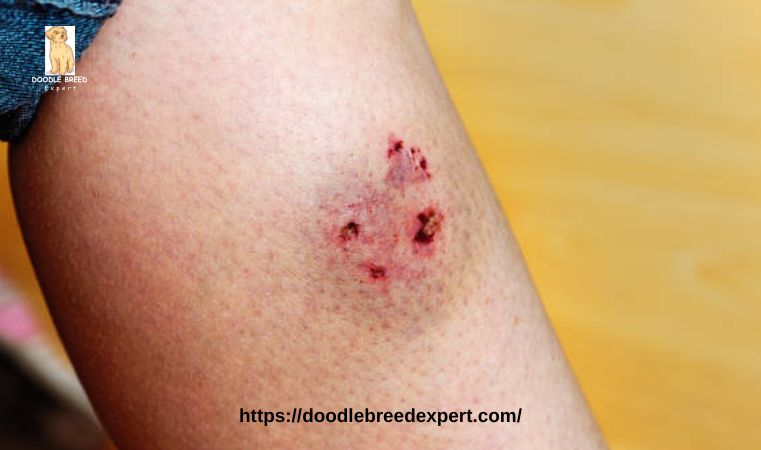Nerve Damage from Dog Bite? While the saying ‘dogs are man’s best friend’ is in common usage, even a very loving one can show aggression and bite a person in certain unfortunate circumstances. Surprisingly, the United States alone has reported more than 4.5 million dog bite incidents in just a year, according to the Centers for Disease Control and Prevention. Of these, nearly 800,000 people are seeking medical treatment for their injuries, with about 334,000 having severe enough injuries to be treated in hospital emergency rooms.
Nonfatal dog bite injuries may include bruises, fractures, deep puncture wounds that often become infected and lacerations. Though it may not seem to be an immediate consequence of a dog bite, Nerve Damage from Dog Bite apparently becomes quite common for victims of dog bites. Despite being domesticated animals, dogs have sharp teeth and jaw strength similar to their wild wolf counterparts.
Research studies have shown that the force with which dogs as large as the Rottweiler bite is around 200 to 300 pounds per square inch. If those bites happen to be in the areas where nerves lie just beneath the skin, like on necks, torsos, thighs, abdomens or hands, then some Nerve Damage from Dog Bite is almost assuredly a fact of existence.
If you have suffered Nerve Damage from Dog Bite or any other injuries due to these dog bites, you may be able to seek compensation from the owner of that animal. The following details come in handy before seeking legal redress.
Nerve Damage from Dog Bite
Dog bites are a severe public health problem. According to the Centers for Disease Control and Prevention (CDC) records, every year, 4.5 million Americans become victims of dog bites, with almost 800,000 people searching for medical care.
Statistically, the highest percentage of dog bites that cause Nerve Damage from Dog Bite affects children. Almost half of all child victims treated in emergency rooms for injuries due to dog bites were under age five.
Young children often experience significant emotional distress during and after the postoperative recovery process following interventions done to restore sensory function, with full recovery usually challenging.
The CDC notes that severe injuries in children requiring hospitalization and plastic reconstruction are more frequent than in adults. Children below five years also have an increased probability of needing to be hospitalized because of their injuries.
The most common animal bites are punctures, lacerations and crushing damage. Dog bites may cause the muscles, tendons, bones and nerves to be damaged in depth. This means that victims of dog aggression are likely to have permanent nerve impairment.
How Dog Bites Can Result in Nerve Damage
One needs an idea of how the human body’s nervous system works to know what Nerve Damage from Dog Bite is. Nerves are a very complex wiring system that sends and receives messages from the brain. These nerves run throughout the body, affording vital channels to transmit information. Without this essential nervous system, we would not know when is a good time to drop a hot pan or quickly pull our feet away from a heat source. Nerves are pivotal in transmitting pain signals, enabling us to respond promptly to hazardous situations.
So, what does a nerve look like? A nerve looks very much like an electric cord but in miniature form. Inside these cords are clusters of single nerve fibres with some coating or casing around them. This outer layer has a double role as it acts not only to protect these fragile nerves but also to insulate them. Just like electrical wires, nerves transmit electric signals. In general, the neurons are poor insulators of electrical energy, but the nerves have evolved to conduct electricity well under the guidance of ionic flow across their plasma membranes.

The real problem arises with the damage to the nerves. The damages could include pressure, stretching, puncture wounds, and lacerations from dog bites. Pressure is one of the widespread damages that dogs cause people since they put so much pressure on people’s bodies. Some breeds, like pit bulls or Rottweilers, are known to put more pressure than other dog breeds.
For example, German Shepherds have bite forces of 238 pounds per square inch (PSI), which is well capable of causing Nerve Damage from Dog Bite. In addition, dog bites can cause the stretching of nerves; for example, a dog may seize an extremity and go on to thrash as well as pull it, putting the nerves under tension and causing much damage. Yet perhaps the most direct way dog bites cause nerve damage involves cutting forces. If a nerve fibre is entirely cut through, this results in irremediable radical nerve impairment.
Types of Nerve Damage Associated With Dog Bite Injuries
Healthy nerves are the vital messengers between the brain and different body sections. Nerve Damage from Dog Bite hampers this communication that influences sensory and motor functions. The effects of such damages chiefly rely on how much damage or in what part of the injury is due to a dog bite.
When a dog bites and its teeth break the skin, it could accidentally cut nerves. Even should the skin not get broken, the overwhelmingly crushing power from a dog’s jaws has enough pressure capability for squishing, stretching, or rupturing nerves. Dog bite injuries usually cause three different kinds of nerve injury:
Neurapraxia:
Also, the softest tissue snap form of dog bite nerve damage; this kind typically originates from nerve compression. It may cause temporary sensory and motor function loss for hours, days, weeks, or months. Most of the dog bite victims who have neurapraxia could fully recover their health over time with proper medical treatment done on them.
Axonotmesis:
More severe than neuropraxia, axonotmesis applies in cases of severely stretched nerves because of dog bites but not completely cut through. The condition might result in paralysis and is commonly temporary. Although most with this type of nerve injury regain functionality after some time, the timeline for recovery ranges from weeks to months and years.
Neurotmesis:
Neurotmesis is the most severe form of dog bite nerve injury that focuses on entirely cut nerves or serious injuries beyond repair. Victims with neurotmesis ordinarily suffer lifetime impairment and are left with permanent sensory loss or functional palsy. Yet, in some instances, timely medical intervention and long-term rehabilitative treatments can render the conditions favorable for partial recovery.
For expert guidance concerning dog bite cases, consider seeking counsel from an experienced personal injury lawyer with a strong background in handling such claims.
Treatment Methods for Nerve Damage Occurred from Dog Bites
In the case of severe nerve damage occurring from dog bites, since recovery usually takes some time, there is a chance that intense medical treatment may be required. For cases of minimal nervous system injuries, there could be a chance that the nerves may heal up by regeneration. In some cases, nerves can undergo spontaneous self-regeneration within minutes, but in others, it may extend over weeks to several months.
More severe Nerve Damage from Dog Bite, especially when the nerve fibres and surrounding covering sheath are severed off completely or grossly damaged, usually requires surgery to assist in proper healing. This mainly applies to delicate body parts such as the human hand that require skilled surgeons. Whilst this is the case, Nerve Damage from Dog Bite remains irreparable and causes a permanent disability even with the skills of the best surgeons.
Read Also: Is TruGreen Safe for Dogs?
Nerve fibers constantly regenerate gradually. In the best-case scenario, those fibres will only grow one inch monthly if reattached through surgery. This long healing period takes months, and full recovery is not guaranteed. However, people may still suffer from numbness, weakness and pain among other symptoms associated with damaged nerves even during this recovery period. Physical therapy proves to be very helpful in this healing process a lot of times.
When the pain turns out to be quite severe, and a lot is felt because of damaging the nerves, doctors may prescribe some pain relievers. But care must also be taken when taking these powerful drugs as they have a tendency for addiction – which is an even bigger problem in the long run.
A Variety of Potential Complications Resulting from Dog Bites
Don’t get bitten by a dog because the potential complications are varied, not only about Nerve Damage from Dog Bite. The following are among the possibilities:
Rabies:
If a dog bites you, and the dog is attacking with froths of saliva, there’s a chance for rabies to transmit from the dog to you. Rabies can cause severe brain inflammation in humans. Urgent medical attention is required after a dog bite, even though the wound seems small. Rabies test is recommended for that case. The same happens in other animal bites because different types of animals may have rabies and transmit it, too.
Psychological Trauma:
The dog bite can be concluded with long-term effects of psychological trauma. As physical injuries heal over time, the psychological injury remains unhealed. Victims may develop a fear of dogs, and they may battle conditions like post-traumatic stress disorder (PTSD) and anxiety. Recognizing that these psychological injuries are just as valid as physical ones is essential.

Disfigurement:
A dog bite injury may leave a person disfigured in their looks and mental state. Scars and blemishes caused by dog bites affect self-esteem and body image. Illinois State law refers to this type of damage as “non-economic” injury because it affects a person psychologically rather than just causing more doctor bills.
Meningitis:
After a dog bite, infection can grow too, resulting in meningitis. Meningitis is when the membrane which covers the brain and spinal cord gets inflamed. Unless immediate medical care is given to the patient bitten by a dog, showing signs of fever, vomiting tendencies and other natural complications on time, it can also prove fatal in the worst cases.
Tetanus:
Tetanus, a bacterial infection, can enter the bloodstream through a dog bite. Testing for tetanus is crucial following a dog bite, as this condition can be fatal under specific circumstances.
How Long It Takes to Recover from a Dog Bite
Recovery after a dog bite takes different lengths depending on the intensity of the injuries and how old the bitten individual is at the attack. About six weeks, however, is the average time across, which usually spans healing. Nonetheless, in some individuals, complete recovery may take months or even longer, significantly if the bite further complicates pre-existing injuries.
In instances where there is a partial or complete loss of obstruction of blood to an extremity, it will require more time for recovery time and severity. For example, if the dog’s teeth had penetrated through the primary artery and vein, both must have occurred surgically because every one of these two would need suturing back together.
FAQs
How Is a Case for Dog Bite Different Than Any Other Personal Injury Case?
The dog owners are responsible for the attacks of the dogs on people. The liability could still apply even if it were not leashed or fenced when the land is found to have served as a doggy daycare centre, boarding facility, sanctuary for abused animals or was used for breeding dogs on-site.
How Long does it take to settle my Dog Bite Case?
The time to settle a dog bite case boils down to your case’s specifications and details. Usually, an individual would expect their personal injury settlement in about 2 to 8 months. Speak to an experienced dog bite lawyer for more information on how long your case will take.
Why Is My Leg Numb After a Dog Bite?
Numbness in your leg after a dog bite may be an early sign of motor Nerve Damage from Dog Bite. This can include any damaged motor nerves, which make it difficult to regain any lost function from the dog bite or other factors that brought on the situation.
Conclusion
The above discourse has clearly illustrated that Nerve Damage from Dog Bite, which results in an impairment of a victim’s sensory and motor functions, as shown in dog bite attack victims, can occasion far-reaching consequences in multiple dimensions of their lives.
The repercussions may be significant, leading to expensive and long-term medical treatment for a cure or, where a complete cure is not possible, to relieve symptoms. Further, where the injuries suffered hinder a victim from performing his prior occupation, he may be forced into alternative employment, earning lesser pay.
Reference:
- Dog Bite Attacks Often Result in Nerve Damage. (n.d.). Inland Empire Law Group. https://www.davidrickslaw.com/library/dog-bite-attacks-often-result-in-nerve-damage.cfm
- Rosenfeld, J. (2023, June 2). Dog Bite With Nerve Damage | Rosenfeld Injury Lawyers | Chicago, IL. Rosenfeld Injury Lawyers LLC. https://www.rosenfeldinjurylawyers.com/chicago-dog-bite-lawyer/nerve-damage/
- Animal Bites – OrthoInfo – AAOS. (n.d.). https://orthoinfo.aaos.org/en/diseases–conditions/animal-bites/






